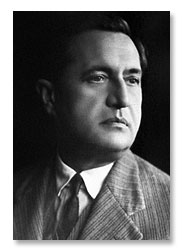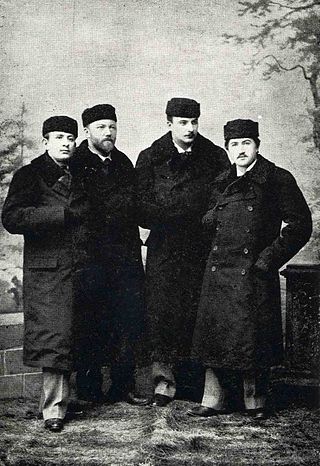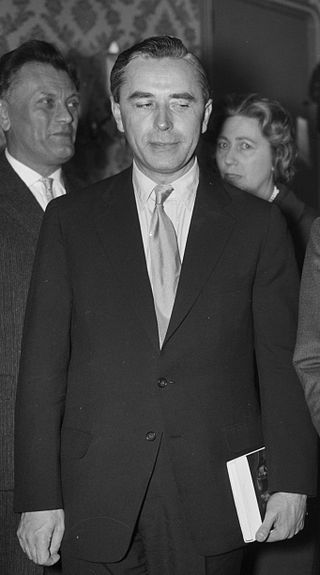External links
- Discographyá
- The Smetana Quartet website - rich photogallery, repertoire, records
| International | |
|---|---|
| National | |
| Artists | |
| Other | |
The Smetana Quartet (Czech : Smetanovo kvarteto) was a Czech string quartet that was in existence from 1943 to 1989, although it was known as the Smetana Quartet only from 1945 onwards. [1]
1st violin
2nd violin
Viola
Cello
The Smetana Quartet arose from the Quartet of the Czech Conservatory, which was founded in 1943 (during the Nazi occupation) in Prague by Antonín Kohout, the cellist. With Jaroslav Rybenský and Lubomír Kostecký as first and second violins, and Václav Neumann as violist, the group gave its first performance as the Smetana Quartet on 6 November 1945, at the Municipal Library in Prague. Neumann left to pursue conducting in 1947, at which point Rybenský went to the viola desk and Jiří Novák (who shared first violin desk with Josef Vlach, founder of the Vlach Quartet, under Vaclav Talich in the Czech Chamber Orchestra) came in as first violin. [2]
By 1949 the group had official connections with the Czech Philharmonic. The first foreign tour was in 1949, to Poland, and the first recording was of the second quartet by Bedřich Smetana in 1950. [3] Rybenský was obliged to retire after ill health in 1952, and was replaced by Milan Škampa. The performers were appointed professors at the Academy of Musical Arts in 1967. [4] Of their many recordings, those made at that time for German Electrola are considered[ by whom? ] particularly fine.[ citation needed ]
For many years this group, which has been called the finest Czech quartet of its time, played the Czech repertoire from memory, giving these works a special intensity and intimacy. [5]
The Smetana Quartet made the third commercial digital recording ever made, Mozart's K.421 and K.458, in Tokyo April 24–26, 1972. [6] They re-recorded the same repertoire ten years later in Prague.
Antonín Kohout trained the Kocian Quartet (founded 1972) [7] and the Martinů Quartet (1976), [8] though the latter's members had been pupils of Professor Viktor Moučka, cellist of the Vlach Quartet.

Karel Ančerl was a Czechoslovak conductor and composer, renowned especially for his performances of contemporary music and for his interpretations of music by Czech composers.

Václav Talich was a Czech violinist and later a musical pedagogue. He is remembered today as one of the greatest conductors of the 20th century, the object of countless reissues of his many recordings.

The Bohemian Quartet was a Czech string quartet of international repute that was founded in 1891 and disbanded in 1933.

Rudolf Firkušný was a Moravian-born, Moravian-American classical pianist.

The Prague Conservatory is a public music school in Prague, Czech Republic, founded in 1808. Currently, the school offers four- or six-year courses, which can be compared to the level of a high school diploma in other countries. Graduates can continue their training by enrolling in an institution that offers undergraduate education.

Josef Suk was a Czech violinist, violist, chamber musician and conductor. In his home country he carried the title of National Artist.

Jaroslav Kocián was a Czech violinist, classical composer and teacher. Together with Jan Kubelík he is considered as the most important representative of "Ševčík´s school". He was celebrated as an interpreter of violin compositions of Johann Sebastian Bach. As a composer he is especially noted for his compositions for the violin, which have been recorded most often by his student Josef Suk.

Supraphon Music Publishing is a Czech record label, oriented mainly towards publishing classical music and popular music, with an emphasis on Czech and Slovak composers.
The Martinů Quartet is a Czech string quartet ensemble founded in 1976, originally under the name Havlák Quartet by students of Professor Viktor Moučka at the Prague Conservatory. In 1985, with the approval of the Bohuslav Martinů Foundation, the quartet assumed its present name Martinů Quartet, pledging to promote the chamber music of Czech composer Bohuslav Martinů. The quartet specialises in the works of Czech composers such as Smetana, Dvořák and Janáček, and especially the works of Bohuslav Martinů. They perform regularly at the Prague Spring Festival as well as concerts in many European Countries, the United States, Canada and Japan. The quartet also teaches chamber music performance at two annual chamber music workshops in the Czech Republic, which are open to both amateur and professional musicians.

František Jílek was a Czech conductor, known especially for his interpretation of Leoš Janáček's works.

Karel Šejna was a Czech double bassist and conductor, the principal conductor of the Czech Philharmonic Orchestra in 1950.
The Vlach Quartet is the name of two consecutive classical string quartet musical ensembles, based in Prague, both of which were founded by members of the Vlach family. The original Vlach Quartet was founded by Josef Vlach in 1950 and wound up in 1975. In 1982 the New Vlach Quartet was founded by his daughter Jana Vlachova, with guidance her father, and came to be known as the Vlach Quartet of Prague, and is still active as a musical ensemble.

The Panocha Quartet is a Czech string quartet.
The Wihan Quartet is a Czech string quartet currently in residence at the Trinity College of Music, London. The quartet was founded at the Prague Academy of Musical Arts in 1985 by Leoš Čepický (violin), Jan Schulmeister (violin), Jiří Žigmund (viola) and Aleš Kaspřík (cello). The group's teacher was Antonín Kohout of the Smetana Quartet and it took its name of Hanuš Wihan (1855–1920), cellist and spiritus rector of the Bohemian Quartet.
Ladislav Černý was a Czech violist and teacher.
The Symphony No. 1, H. 289, is an orchestral composition by the Czech composer Bohuslav Martinů.

The Kocián Quartet is a Czech classical chamber ensemble. Originally named the New String Quartet, it was founded in 1972 by three members of the Prague Symphony Orchestra with Pravoslav Kohout as 1st violin. In 1975 they were renamed the Kocián Quartet in honor of famous violinist Jaroslav Kocián.
Antonín Kohout was a Czech cellist and founder of the Smetana Quartet.

Pavel Hůla was a Czech violinist, music conductor and music teacher.

Jiří Karel Herold was a Czech violist, music teacher and violinist. He was concertmaster of the Czech Philharmonic, violist of the Czech Quartet and the Herold Quartet.